This article was originally published in the May/June 2022 Issue of the WatchTime print magazine. Photos by Patek Philippe and archive.
With its classic round case, clean lines, tidy dial and distinctive clous de Paris bezel, the Calatrava is a flagship of the Geneva-based Patek Philippe manufacture. There hasn’t been a Calatrava with the famous guilloché finish in the collection since 2018, so the latest model returns this decorative pattern to the limelight. And this style icon has also been given a contemporary hand-wound caliber with a long-lasting power reserve.
When the Stern family took over management of Patek Philippe in 1932, the company was not yet strongly involved in producing wristwatches. But the Sterns recognized where the future lay and understood that they needed to bring the company’s pocket watch expertise to timepieces for the wrist. In the same year, the now-legendary Reference 96 was introduced, the first model from the manufactory that was given a reference number.

Based on the minimalist Bauhaus principle, which insists that form follows function, Reference 96 has been interpreted in countless versions, but always unmistakably. It has had flat or slightly rounded bezels, which were sometimes smoothly polished, set with jewels or guillochéd. There have been extra-slim versions and officers’ cases with hinged backs. The dials, always simple and tidy, sometimes showed only hours and minutes, while other times a hand for the seconds was added, and occasionally there was also a date display.
According to Patek Philippe, new Reference 6119 pays homage to two models: the legendary Reference 3919 from 1985, which was in production for more than two decades, and its 2006 reinterpretation as Reference 5119. The latter had a larger case, which increased in diameter from the 33.5 mm of Reference 3919 to 36 mm for Reference 5119 and now to a contemporary 39 mm for Reference 6119. “We wanted to make the Calatrava more masculine,” explained President Thierry Stern. He said they started with 40 mm, but that was too big. One millimeter can make an astonishing difference.
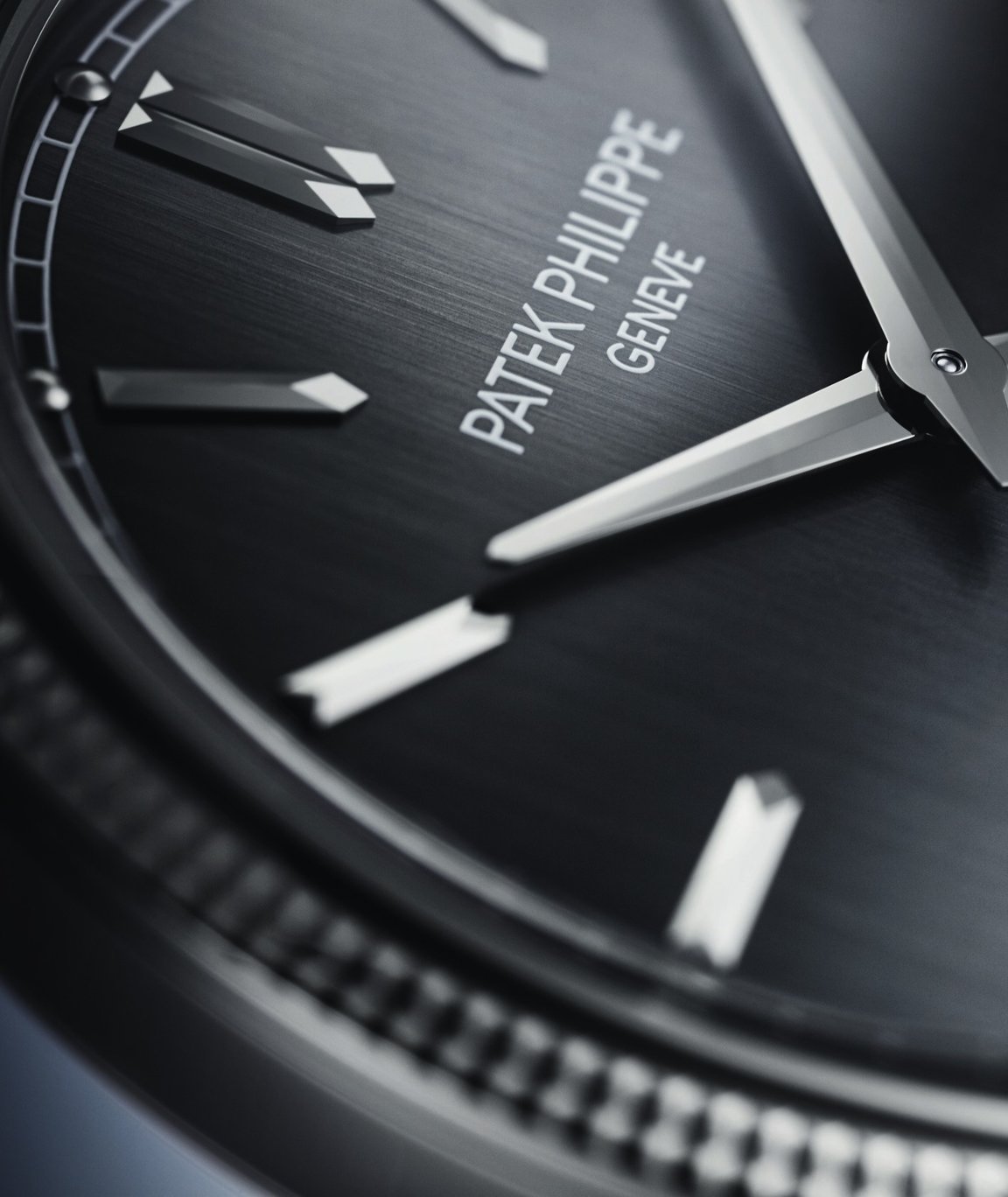
Further design nuances are inspired by several other models. The applied, multifaceted, obelisklike hour indexes, including the double marker at the 12, lead back to the roots of Calatrava design and refer both to Reference 96 from 1932 and to Reference 96D from 1934. The triplefaceted dauphine-shaped hour and minute hands are also reminiscent of Reference 96. And last but not least, the curved lugs, which have been abandoned and reinstated several times, also lead back to the very beginning. Following the example of the first Calatrava, the lugs create an ergonomically perfect transition from the case to the bracelet and ensure a high level of wearing comfort. The white-gold Calatrava 6119G-001 is attached to a shiny black alligator leather strap with a white-gold pin buckle. The clasp’s characteristic shape was designed for the American market by former president Henri Stern, grandfather of current president Thierry Stern.
Now back to the dial. The face of the whitegold Calatrava comes in a trendy anthracite color with a vertical satin finish. The applied indexes and dauphine hands are made of white gold, the same material as the case. With their numerous facets, they play with the light, but also ensure sufficient contrast and excellent legibility. If you take a closer look, you’ll notice the fine coordination of the lines, angles and edges between the indexes and hands.

The railway minute scale is a new detail at the very edge of the dial. Twelve small hemispherical hour appliqués are appropriately positioned along the scale. A small second hand shaped like a slender needle is at the 6. This slim pointer moves over a circular subdial, which is subdivided into four sections by a crosshair and marks the passing seconds with finely drawn index lines in 5-second increments. All this is covered by a sapphire crystal in a so-called “box shape,” encircled by the famous clous de Paris bezel.
Clous de Paris is a special type of guilloché or embossing in which tiny pyramid shapes with square bases are created by intersecting cuts. Literally translated, clous de Paris means “nails of Paris.” And indeed, the pyramid-shaped points trace their ancestry to nails that were formerly made in Paris, which is why clous de Paris is also known as the “horseshoe-nail” pattern. The tiny pyramids are meticulously crafted from the solid metal by the manufactory’s craftspeople, according to the rules of their art, as they guide a motorized milling tool and then polish them. The guillocheur guides the graver horizontally with one hand while the other hand moves the tool vertically. The result is two concentric circles with a slightly beveled profile on which tiny pyramids line up to create a sophisticated play of light that gives greater depth to the dial. The Calatrava’s bezel is one of the most famous examples of clous de Paris craftsmanship. This décor is also crafted by Audemars Piguet and Breguet, but to beautify the dials rather than the bezels.

The Calatrava was launched in 1932 and given its clous de Paris bezel in 1934. As the latest since the launch of the famous Reference 3919 in 1985, this model has been a prime example of Patek Philippe’s styledefining elegance.
For many years, Patek Philippe equipped the Calatrava with hand-wound Caliber 215 PS, where PS stands for petite seconde (small seconds). The development of new hand-wound Caliber 30-255 PS (also with small seconds) for Reference 6119 was based on the desire for a movement with a larger diameter that could be housed in an exceptionally slim case. Regarded as a milestone by Patek Philippe, this movement further expands the brand’s extensive collection of manufacture calibers.

Caliber 30-255 PS has an overall diameter of 31 mm, compared to 21.9 mm for Caliber 215 PS. As can be seen in its designation, the overall height remains unchanged at 2.55 mm. New design solutions had to be found in order to maintain this low height while simultaneously meeting modern functional requirements such as a power reserve of 65 hours or a stop-seconds function. For example, there is power transmission by a central pinion, which meshes with the minute wheel via an intermediate wheel; a pulse-generating stop-seconds spring; and a winding mechanism designed in such a way that the ratchet wheel and crown wheel are located below rather than above the barrel bridge.
The central pinion and the intermediate wheel ensure that the two barrels connected in parallel can transfer their energy to the gear train simultaneously. Parallel connection is a rarely used construction. Unlike barrels connected in series, parallel construction increases the movement’s torque because the force of each barrel combines with that of its counterpart. This solution achieves maximum power while simultaneously permitting a slim construction and the use of a balance with a very high moment of inertia (10 mg per cm2). In physics, the moment of inertia describes how sluggish a rotatably mounted body is in relation to changes in its state of motion. Caliber 30-255 PS has the highest moment of inertia of all 4-Hz movements from Patek Philippe. It guarantees high stability for the rate and facilitates fine adjustment of the movement via four weights on the rim of the Gyromax balance. These same objectives are pursued by the frequency of 28,000 vibrations per hour. With a maximum daily deviation from –3 to +2, Caliber 30-255 PS complies with the extremely strict requirements for accuracy demanded by the Patek Philippe quality seal. Among other details needed to uphold these rigorous criteria, it is equipped with the long-awaited stop-seconds mechanism, in which an elongated spring arrests the balance when the crown is pulled out, thus enabling the user to set the time to the nearest second. When the crown is pushed in again, the mechanism gives a slight impulse to the inertial balance, thus setting it into motion again.

When designing the architecture of the new movement, attention was naturally paid to respecting time-honored traditions, according to which wheel or function is given its own bridge. This is why a gaze through the sapphire crystal in the caseback shows that Caliber 30-255 PS has six handsomely shaped bridges and cocks, each finished in accordance with the finest horological tradition. Embellishments include côtes de Genève, perlage and satin finishes, as well as beveled edges and polished screws. The appealing aesthetics should not distract from the fact that, thanks to its constructive and technical solutions, Caliber 30-255 PS is both exceptionally robust and absolutely state of the art, with a stop-seconds mechanism and a power reserve of almost three days.
Although the tradition of the Calatrava dates back to Reference 96 from 1932, the name itself has only been used since 1982 to designate this family of simply elegant watches from Patek Philippe. For many watch connoisseurs, Reference 3919 with hand-wound Caliber 215 PS, which was launched in 1985, is the quintessential Calatrava and the epitome of a simple yet elegant wristwatch.
The Calatrava story goes back much further for Patek Philippe. Almost a century earlier, on April 27, 1887, the Geneva-based manufacture officially registered the Calatrava cross as a legally protected trademark. The aesthetically compelling symbol of a Spanish order of knights from the late 12th century remains unaffected by any whims of fashion as a trademark of Patek Philippe today.

Patek Philippe Calatrava Specs:
Manufacturer: Patek Philippe SA Gene ̀ ve, Chemin du Pont-du-Centenaire 141, 1228 Plan-les-Ouates, Switzerland
Reference number: 6119G-001
Functions: Hours, minutes, small seconds
Movement: Caliber 30-255 PS, manually wound, 28,800 vph, 27 jewels, Spiromax (made of Silinvar) hairspring, Gyromax balance, regulating weights on rim of balance fine adjustment , Incabloc shock protection, 65-hour power reserve, diameter = 31.0 mm, height = 2.55 mm
Case: 18k white gold, box-shaped sapphire crystal above dial, sapphire crystal in back, water resistant to 30 m
Strap and clasp: Black leather alligator strap with white-gold pin buckle
Dimensions: Diameter = 39.0 mm, height = 8.08 mm, lug width = 21.0
Variations: In rose gold (Ref. 6119R-001, $30,750)
Price: $30,750
To learn more about Patek Philippe, click here, and to subscribe to the WatchTime print magazine, click here.

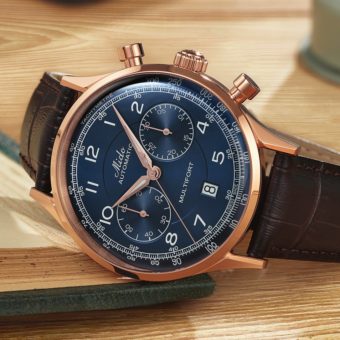

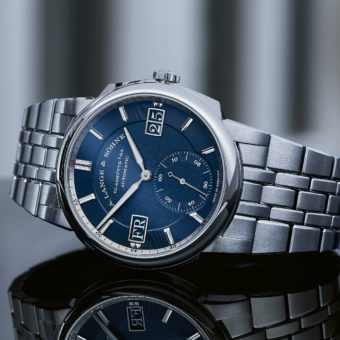

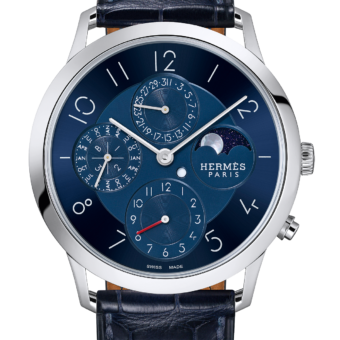
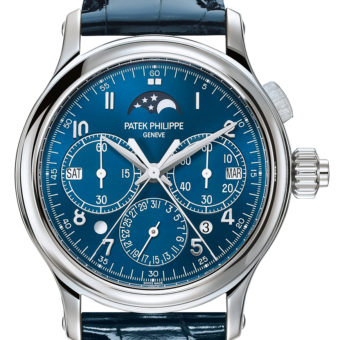
Whilst Inwas keep to buy one of these entry level Patek’a it simply did not look good on my wrist…
Even at 39mm the watch looks too big on my wrist due to it being so flat….
The 5227 has the same 39mm dimensions but sits a little taller and in my opinion is a more resolved design…
The wait for the perfect Calatrava continues…